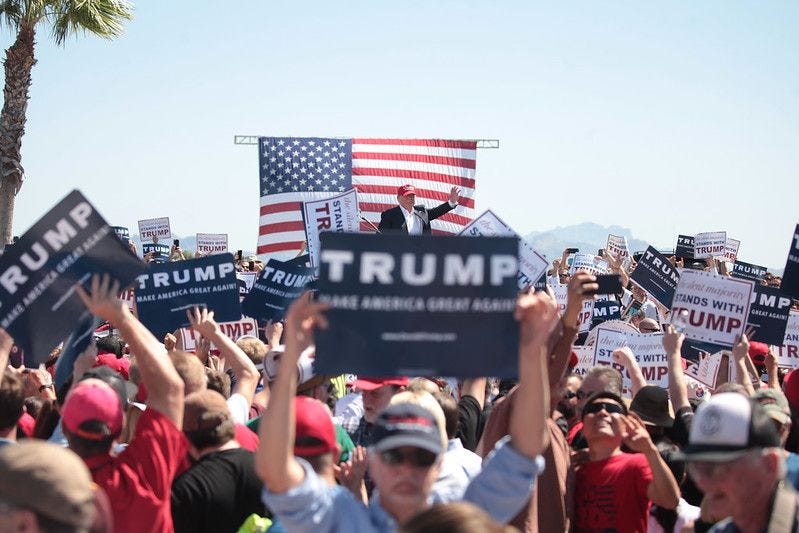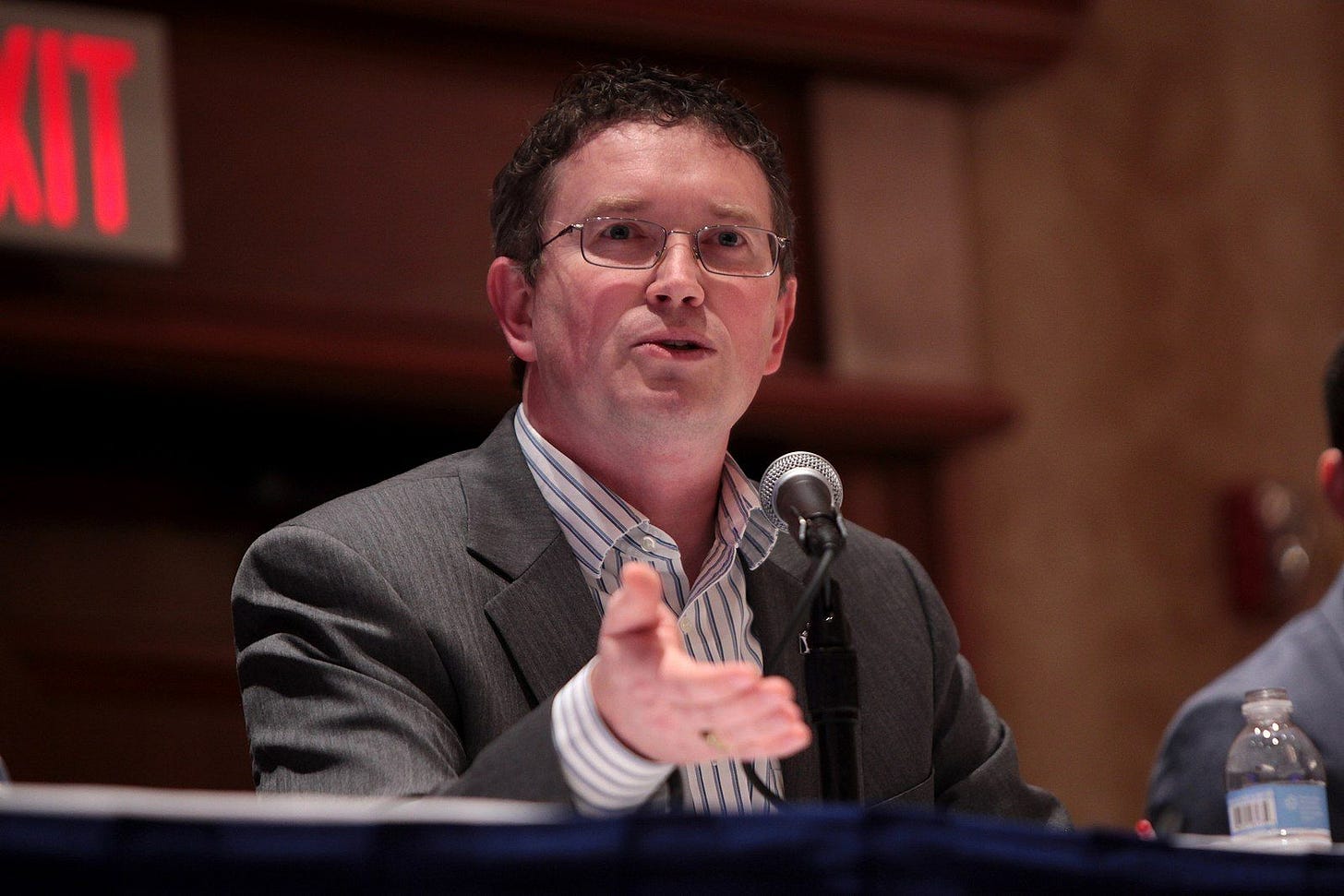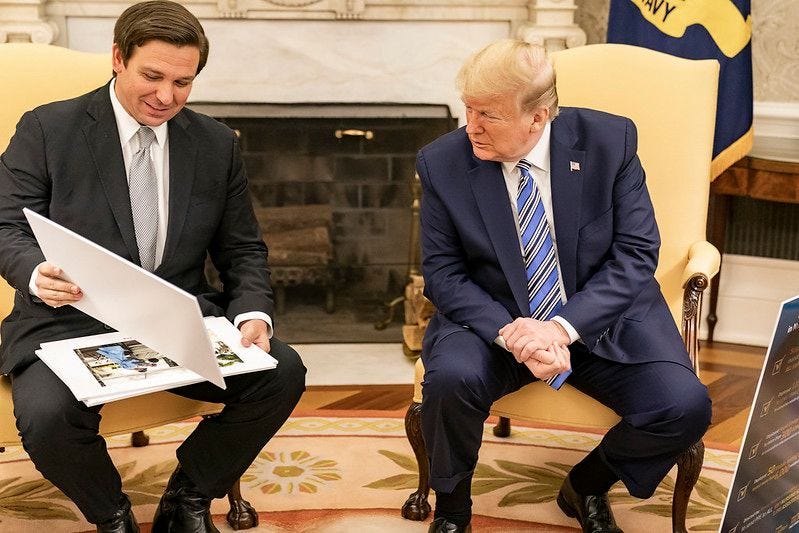Trump’s triangulation strategy
Voters in 2016 viewed Trump as an ideological moderate. He’s trying to recapture that image with his 2024 bid.
📣 If this newsletter was forwarded to you, subscribe here. If you want to contribute to support my work, donate here.
It may be hard to remember now, but a wide swath of voters used to view Donald Trump as an ideological moderate.
A Pew Research poll in 2016 found that 40% of voters said Trump held “a mix of liberal and conservative views,” almost as many as the 44% who said “most or almost all” of his positions were conservative. (The remaining 11% said they were mostly liberal.)
For comparison, just 28% said Hillary Clinton’s views were “a mix of liberal and conservative,” while 58% said they were mostly liberal and 10% said they were mostly conservative.
According to a Gallup poll taken around the same time, voters viewed Trump as significantly less conservative than every other Republican presidential nominee in modern history, including Mitt Romney and John McCain.
Seven years later — after his divisive presidency, January 6th, a dinner with anti-semites, and a call to suspend the Constitution — Trump isn’t seen as quite so moderate. A Reuters/Ipsos poll in September 2022 found that 58% of Americans view Trump’s “Make America Great Again” movement as so extreme that it is “threatening America’s democratic foundations.”
But Trump, as he vies once again for the White House, is showing signs of trying to recapture his moderate image, broadcasting some of his same heterodox policy views from the 2016 campaign — even when they contradict how he governed while serving as president.
On abortion: Trump posted on Truth Social earlier this month that the “abortion issue” cost Republicans seats during the 2022 midterms, alleging that it had been “poorly handled” by GOP leaders, “especially those that firmly insisted on No Exceptions, even in the case of Rape, Incest, or Life of the Mother.”
It was his latest attempt to distance himself from the Supreme Court decision overturning Roe v. Wade, even though he appointed the three justices who cast the decisive votes. (Trump has also taken credit for the decision, while fretting in public and private about its political impact.)
On spending: The former president weighed in on another fierce political battle last Friday, calling on Republican lawmakers to preserve spending for entitlement programs in the dispute over the debt ceiling. “Under no circumstances should Republicans vote to cut a single penny from Medicare or Social Security,” Trump declared.
Trump made a similar promise in his 2016 campaign, although he also pledged not to slash funding for Medicaid — which he repeatedly tried to do as president — and eventually suggested that he would consider Medicare and Social Security cuts in a second term as well.

Trump’s attempted swerve to the middle comes as conservatives are increasingly looking for another standard-bearer in 2024. A number of prominent evangelicals have told reporters that they’re flirting with backing Gov. Ron DeSantis (R-FL) if he challenges Trump for the GOP presidential nomination. (“That’s a sign of disloyalty,” Trump said in response to Christian leaders who have yet to endorse him.)
Just this weekend, DeSantis came out on top in a straw poll at the National Pro-Life Summit, with 53% of the conference’s thousands of attendees calling him their top choice for president. Just 19% expressed a preference for Trump.
Trump reportedly views DeSantis’ support while in Congress for slashing entitlement programs as a major vulnerability, one he intends to explain in a 2024 showdown. Many of the ex-president’s top allies in Washington, of course, are currently calling for the same spending cuts in exchange for raising the debt ceiling.
It remains to be seen whether general election voters will accept Trump’s new attempts to turn back the clock and triangulate like it’s 2016 again. If anything, in the Republican primary, it may hurt him, allowing more conservative rivals to find room to his right while the “never Trump” candidates in the race lock up votes from the party’s moderates.
Although Trump is the only announced candidate in the race, his potential competitors are already jostling for position. “I would nudge every governor to do what they can do back up their pro-life record,” Gov. Kristi Noem (R-SD) said in a CBS News interview last week, appearing to take a shot across the bow at DeSantis (although the criticism could also just as easily apply to Trump after his recent statements.)
In Noem’s South Dakota, abortion is now completely banned, with only an exception if the mother’s life is in danger. DeSantis, meanwhile, has only signed a 15-week abortion ban in Florida, sparking criticism from conservatives that he should have pushed for legislation that went farther.
Trump’s former secretary of state Mike Pompeo, another possible 2024 candidate, came out with a memoir last week in which he sought to undermine Trump’s credentials on China. At the beginning of the Covid-19 pandemic, when Trump was still praising Xi Jinping and had yet to blame China for the viral outbreak, Pompeo recounted that Trump told him to “shut the hell up for a while” about China to avoid angering Xi.
Former Vice President Mike Pence has also been hawking a new memoir and staffing up for a 2024 bid, notably announcing this week that he had poached the top aide of another possible presidential candidate, former UN ambassador Nikki Haley.

While Trump frequently posts online about his continued dominance over the GOP, he has been unwilling so far to test that strength in the real world. Perhaps afraid that his 2024 events will not have the attendance or energy of the rip-roaring rallies from his first campaign, Trump has largely remained cocooned at Mar-a-Lago since announcing and refrained from holding a single public event.
His time in hiding will end this weekend, as he makes stops on Saturday in New Hampshire and South Carolina, visiting two of the key early presidential primary states for the first events of his campaign.
Trump’s team has already run into trouble planning the events, however. Per the Washington Post, Trump advisers have “blanketed” South Carolina Republican officials with calls to drum up endorsements ahead of his rally there, but they’re finding few takers.
“There is more than a little bit of softening” among Trump’s onetime backers in South Carolina, influential conservative activist Dave Wilson told the Post, pointing to Trump’s recent comments on evangelicals as one reason behind the dip in his support.
More news you should know.
Five more January 6th rioters were convicted on Monday. Four were members of the Oath Keepers, a right-wing militia group, while the fifth was the man famously photographed with his feet on a desk in Nancy Pelosi’s office. In the last two years, nearly 1,000 Capitol rioters have faced criminal charges; about half have pleaded guilty or been convicted so far, with more trials on the way.
Several shootings shootings took place in the U.S. throughout the day, including attacks that killed seven people in Half Moon Bay, California, two in Chicago, and two students at a school for at-risk youth in Des Moines, Iowa. A trio of Democratic senators responded to the shootings — as well as Saturday’s in Monterey Park, California, which killed 11 — by re-introducing an assault weapon ban, which is doomed to fail in both the House and Senate.
Former top FBI official Charles McGonigal was indicted on charges that he took secret payments from Russian oligarch Oleg Deripaska in exchange for influencing investigations and working to get Deripaska removed from the U.S. sanctions list. McGonigal, who served in the bureau for 22 years before retiring in 2018 as the New York Field Office counterintelligence chief, pleaded not guilty.
Speaker Kevin McCarthy appointed three right-wing members to the House Rules Committee, delivering on a promise he made while vying for the gavel. The Rules Committee has considerable influence over which bills make it to the House floor and the terms of debate once they do; appointing its members is traditionally one of the key sources of a speaker’s power. Now, Reps. Thomas Massie (R-KY), Ralph Norman (R-SC), and Chip Roy (R-TX) could band together with the panel’s four Democrats to block McCarthy’s chosen legislation from reaching the floor.

Recommended reads:
“Dems concerned over handling of Biden documents” Politico
“U.S. Weapons Industry Unprepared for a China Conflict, Report Says” WSJ
“ChatGPT passes MBA exam given by a Wharton professor” NBC
What your leaders are doing today.
All times Eastern.
WHITE HOUSE: President Biden will huddle with Democratic congressional leaders. He will also receive his morning intelligence briefing and host a reception for new members of Congress. Vice President Harris will join all three events.
The daily White House press briefing will be led by press secretary Karine Jean-Pierre. [Watch at 1:30 p.m.]
CONGRESS: The House will vote on legislation covering federal hiring and agency settlements. The bills are:
— “The Chance to Compete Act,” which would reform the federal hiring process to focus on an applicant’s skills and competency rather than whether they received a college degree.
— “The Settlement Agreement Information Database Act,” which would require federal agencies to post the text of any settlements they enter into online. [Watch the House session starting at 12 p.m.]

The Senate has no votes scheduled. The chamber will recess in the middle of the day for its closed-door party caucus lunches. [Watch the Senate session starting at 10 a.m.]
The Senate Judiciary Committee will hold a hearing on antitrust allegations against Ticketmaster in wake of the Taylor Swift ticketing fiasco. The CEOs of both Live Nation and SeatGeek will testify. Ticketmaster, which merged with Live Nation in 2010, is being investigated by the Justice Department as a possible monopoly. [Watch at 10 a.m.]
COURTS: The Supreme Court has nothing scheduled today. Its next oral arguments are set for February 21.
A Georgia judge will hear arguments on whether a grand jury report on Donald Trump should be released to the public. The Fulton County grand jurors, who spent eight months investigating efforts by Trump and his allies to overturn the 2020 election, voted to recommend their report be made public.
Before I go...
Here’s an uplifting story: About a decade ago, Hody Childress — a farmer in the small town of Geraldine, Alabama — walked into a local pharmacy and asked the owner if there were families nearby who couldn’t pay for their medications.
There were. So Childress handed the pharmacist a $100 bill — and continued the practice every month for the next 10 years, eventually paying for the medications of several hundred people in the community.
He insisted the families not be told, and they didn’t discover the identity of their mysterious benefactor until his death at the beginning of this year.
“It was just who he was,” his daughter Tania Nix said. “It was in his heart.”
Read the full story here, via the Washington Post.
Thanks for reading.
I get up each morning to write Wake Up To Politics because I’m committed to offering an independent and reliable news source that helps you navigate our political system and understand what’s going on in government.
The newsletter is completely free and ad-free — but if you appreciate the work that goes into it, here’s how you can help:
Donate to support my work or set up a recurring donation (akin to a regular subscription to another news outlet).
Buy some WUTP merchandise to show off your support (and score a cool mug or hoodie in the process!)
Tell your family, friends, and colleagues to sign up at wakeuptopolitics.com. Every forward helps!
If you have any questions or feedback, feel free to email me: my inbox is always open.
Thanks so much for waking up to politics! Have a great day.
— Gabe



